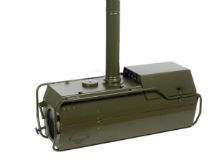Dantherm Air Handling Visit Soldiers in Afghanistan
The Dantherm Air Handling defence team have visited Danish soldiers in Afghanistan, Iraq and other locations where the company’s air handling systems are making a huge difference.
Which would you prefer: Being left out in the burning sun in Chad in the West African desert, running across the local air landing strip lugging 42kg of luggage in an attempt to catch the last flight out? Or a nightly two-hour drive accompanied by a couple of heavily armed soldiers in a Hummer on the road from the Kuwaiti border to the city of Shaiba in the Iraqi province of Basra – a road where roadside bombs and terrorist attacks are a regular part of the night’s unrest?
Most would say no thank you to both. But that was not an option for the head of Dantherm Air Handling’s defence segment when he found himself in the uncomfortable and risky situations described above – both of which had positive outcomes, luckily. These scenarios were part of his visits to the soldiers that use air handling systems from Dantherm Air Handling’s defence segment on a daily basis.
He has travelled to several hotspots to see for himself how the equipment works in the field and to show the soldiers the best way to use the equipment. One of his most recent trips took him to Afghanistan where he spent a couple of weeks visiting the Danish Camp Bastion in the Helmand province.
From heating to cooling
“The air handling systems we supply to the military were originally used for heating purposes in cold climates. But with the new post-Cold War global situation that has developed with NATO soldiers being sent to hotspots elsewhere in the world, we now chiefly supply air-conditioning systems, for instance for cooling military tents,” he explains.
“These systems have to be extremely robust as well as easy to install and operate, even under the most extreme weather conditions. And our equipment meets those requirements. We still sometimes receive fault reports, but when we look into the matter further, the system in question almost always turns out not to be faulty after all. Instead, the problem is often with the installation or operation of the system. All things considered, it isn’t all that surprising since soldiers have very different professional backgrounds and are not experts in air handling systems.
“But that doesn’t change the fact that we prefer to avoid operating errors to keep the systems functioning optimally. In Afghanistan, temperatures can easily reach 55-60°Celsius. So it’s crucial that the systems can give the soldiers the comfort they need in order to function properly on a daily basis. That is why when I visit a site like Camp Bastion in Afghanistan, I not only check the systems, but also instruct the soldiers in how to use them properly.”
Visits boost credibility
“I always receive a warm welcome when I visit Danish and other NATO soldiers stationed around the world. Both privates and officers appreciate the interest in their welfare that my visits reflect. At the same time, I also acquire useful knowledge and gain inspiration on how we can make our systems even better and more user-friendly. Several places I was told by the soldiers that Dantherm Air Handling is the first supplier to ever pay visits to them. This is something which really boosts our credibility which is particularly important in the defence sector where personal relationships between the customer and the supplier play a much greater role than in other areas,” says the head of Dantherm Air Handling’s defence segment, who admits having been nervous and tense, but never actually scared on his visits to the world’s hotspots.
“I only go if I think the security situation is acceptable. Of course, situations can arise that I would have preferred to avoid. Such as the nightly drives up through Iraq. But everything turned out ok.”







